#male mental health
Explore tagged Tumblr posts
Text
Men need affection too
429 notes
·
View notes
Note
https://www.youtube.com/watch?v=NcTBjZ_za_M
Here's a very disappointing of a therapist talking about Bucky and agreeing with what TFATWS said about him. Apparently, even though Bucky had no choice with the killings, he still needs to take responsibility for them.
Also Bucky's therapist was good because she 'didn't put up with his bullshit'. His 'bullshit' was not trusting or opening up to her, but why would he do that when she insults him and deliberately triggers him. They say 'she's exactly the kind of therapist he needs' even though earlier they said in a situation like his, it's important to have people who love you unconditionally.
They also liked the scene with Sam's advice. They agreed with Sam telling Bucky that it's his job to make the other victims of Hydra feel better and get closure. It's really sad that only two people ever acknowledged Bucky as a victim: Steve and T'challa.
At least they also agreed that Sebastian is a phenomenal actor.
Thanks so much for sending me this!
I clicked and I saw it was Cinema Therapy. They *finally* made a video about Bucky.
youtube
We've literally been asking them for one for 3 years or more. Funny how he only got half an hour though, when Tonky got more than double that. (Although I understand there's a 45-minute version on their Patreon page...)
Also, I am glad they put him in the "hero" category not "villian" or antihero.
I am about halfway through it at the moment and I am starting to see what you mean, though. What really bothered me was the intro sequence where they said Bucky was "partly to blame" for the actions of HYDRA- and yet still compared him to an abuse survivor. So abuse survivors are "partly to blame" for the actions of their abusers? Its weirdly contradictory for them to talk about Bucky needing unconditional love and compassion- and yet be fine with his therapist's horribly insensitive treatment of his trauma. Also Sam's whole "tough love" thing. Isn't that the opposite of compasssion? Others have gone into how it could potentially be not only traumatizing but even dangerous for Bucky to approach family members those he killed without professional supervision or mediation.
I personally suspect that maybe the somewhat contradictory statements arise from people's reluctance to criticize The Falcon and the Winter Soldier show in any capacity. You know what happens if you do.
The other possibility is the attitude to male victims in general. Natahsa was never forced to make amends, or blamed for the actions of The Red Room. Bucky is. Why?
Mostly I suspect its because society has brainwashed men into thinking they can't be victims. They must have *wanted* what happened to them, and if they are vulnerable or struggling then that amounts to "weakness".
Look at the attitude of many fans towards Bucky overall, and how they equate basic compassion with "coddling" or say he needs to stop feeling sorry for himself and "get his shit together".
This is absolutely typical of the rhetoric that male victims are subjected to in real life. And the rhetoric surrounding male mental health as a whole. Men aren't allowed to be struggling, men aren't allowed to need help. Men aren't allowed to be be in pain or emotional and above all men aren't allowed to be victims.
Except they 100% are.
#bucky barnes#mcu#sam wilson#christine raynor#cinema therapy#male mental health#tfatws#winter soldier#mental health#ptsd#captain america: the winter soldier#captain america#captain america: the first avenger#james buchanan barnes
56 notes
·
View notes
Text
The more women are paid, the less eager they are to marry. A 1982 study of three thousand singles found that women earning high incomes are almost twice as likely to want to remain unwed as women earning low incomes. "What is going to happen to marriage and childbearing in a society where women really have equality?" Princeton demographer Charles Westoff wondered in the Wall Street Journal in 1986. "The more economically independent women are, the less attractive marriage becomes."
Men in the '80s, on the other hand, were a little more anxious to marry than the press accounts let on. Single men far outnumbered women in dating services, matchmaking clubs, and the personals columns, all of which enjoyed explosive growth in the decade. In the mid-80s, video dating services were complaining of a three-to-one male-to-female sex ratio in their membership rolls. In fact, it had become common practice for dating services to admit single women at heavily reduced rates, even free memberships, in hopes of remedying the imbalance.
Personal ads were similarly lopsided. In an analysis of 1,200 ads in 1988, sociologist Theresa Montini found that most were placed by thirty-five-year-old heterosexual men and the vast majority "wanted a long-term relationship." Dating service directors reported that the majority of men they counseled were seeking spouses, not dates. When Great Expectations, the nation's largest dating service, surveyed its members in 1988, it found that 93 percent of the men wanted, within one year, to have either "a commitment with one person" or marriage. Only 7 percent of the men said they were seeking "lots of dates with different people." Asked to describe "what concerns you the day after you had sex with a new partner," only 9 percent of the men checked "Was I good?" while 42 percent said they were wondering whether it could lead to a "committed relationship."
These men had good cause to pursue nuptials; if there's one pattern that psychological studies have established, it's that the institution of marriage has an overwhelmingly salutary effect on men's mental health. "Being married," the prominent government demographer Paul Glick once estimated, "is about twice as advantageous to men as to women in terms of continued survival." Or, as family sociologist Jessie Bernard wrote in 1972:
“There are few findings more consistent, less equivocal, [and] more convincing, than the sometimes spectacular and always impressive superiority on almost every index—demographic, psychological, or social—of married over never-married men. Despite all the jokes about marriage in which men indulge, all the complaints they lodge against it, it is one of the greatest boons of their sex.”
Bernard's observation still applies. As Ronald C. Kessler, who tracks changes in men's mental health at the University of Michigan's Institute for Social Research, says: "All this business about how hard it is to be a single woman doesn't make much sense when you look at what's really going on. It's single men who have the worst of it. When men marry, their mental health massively increases."
The mental health data, chronicled in dozens of studies that have looked at marital differences in the last forty years, are consistent and overwhelming: The suicide rate of single men is twice as high as that of married men. Single men suffer from nearly twice as many severe neurotic symptoms and are far more susceptible to nervous breakdowns, depression, even nightmares. And despite the all-American image of the carefree single cowboy, in reality bachelors are far more likely to be morose, passive, and phobic than married men.
When contrasted with single women, unwed men fared no better in mental health studies. Single men suffer from twice as many mental health impairments as single women; they are more depressed, more passive, more likely to experience nervous breakdowns and all the designated symptoms of psychological distress—from fainting to insomnia. In one study, one third of the single men scored high for severe neurotic symptoms; only 4 percent of the single women did.
-Susan Faludi, Backlash: the Undeclared War Against American Women
448 notes
·
View notes
Text
Boys Need Better Representation Too
If we stop and think about it, most of the content trying to help people work through their insecurities and build confidence is catered toward women.
Sure, there’s self-improvement content catered toward more general audiences, but when it comes to helping people celebrate the physical features they were born with, most of us prioritize women’s insecurities over male insecurities.
Whether you’re self-conscious about curly hair, dark skin, a few extra pounds or acne, there’s an encouraging artwork or inspirational video out there to remind you you’re beautiful. But once again, most of this content is by women, for women.
I’m guilty of this too.
The artists I follow (and love) who do ‘drawing insecurities’ videos are all drawing women. The fashion brands I watch videos for (and love) which feature inclusive sizing are all made for or marketing to women.
But boys have insecurities too, and they are also seriously lacking representation.
Those of us who really care about encouraging diversity-positivity and self love are pouring our hearts and souls into creating content to help women across the world realize that they are beautiful.. We make dark skinned female leads. We make drawings of beautiful plus-sized queens.
But there aren’t a whole lot of relevant dark-skinned or plus-sized guys in the media either. Or skinny superheroes. Or short male leads. The list goes on.
There are a LOT of male beauty standards that many guys still feel frustrated and depressed by being unable to fit, whether they’re “not muscular enough” or they can’t grow a beard.
In countries where colorism is an ongoing issue, it often affects boys as well as girls, and yet, when I read webcomics like “Your Smile Is a Trap” and “Love Love Fighting” (again, stories that I love) the female leads stray outside the beauty box, while the male leads still fit the cultural beauty standard.
How many Black superheroes can you think of who have TV shows currently airing?
How many male superheroes can you think of who don’t have the quintessential square jaw and perfect hair?
I know of a few Asian romance webcomics with brown skinned female leads but I’ve not seen any with brown skinned male leads.
Part of what it means to work outside the beauty box is to prioritize people other than ourselves. We work to help more people feel seen. I spend a lot of time promoting diversity positivity for women, hispanics and members of the black diaspora, but with the world the way it is now, there is almost always some demographic or another being ignored or overlooked, and that means we need to keep widening our perspectives.
The media needs more male leads who are shorter than the female lead. We need male characters who are plus-sized or disabled or dark skinned but aren’t deemed second rate or stuck playing second fiddle to the guys who fit the beauty standard.
I’m not sure why, but working outside the beauty box actually seems to be even harder to manage with male characters than it is with female characters. I think it’s because of a subconscious global bias. We know girls are sensitive about their looks and so anyone who wants to diss a girl for not fitting the beauty standard is labeled a monster. Yet people constantly dismiss guys coldly and carelessly and they’re just expected to suck it up.
I had to cancel a comic project I was working on because the artist didn’t want to give the male lead dark skin, and I still haven’t found a new artist to work with. The project before that, the artist didn’t mind the female lead being black but was bigoted against the male lead for being Korean.
People of every ethnicity, shape, and size deserve to see themselves in the media.
Our bodies are beautiful. Individuality is beautiful, and men’s mental health and self-esteem matters every bit as much as women’s mental health and self-esteem.
Guys deserve to live in a world that accepts and loves them. They shouldn’t have to quietly deal with being bullied for their physical appearances while being expected to ‘suck it up’ or ‘be a man’ and get over it.
Beauty standards are hurtful. Period. Everyone needs to hear the words ‘you’re beautiful’ sometimes.
So I’ll be the first one to say it.
You’re beautiful.
#beauty standards#male beauty standards#male insecurities#insecurities#representation#representation matters#plus sized characters#dark skin is beautiful#dark skinned boys#toxic beauty standards#male ocs#male characters#men's mental health#male beauty#male mental health#self esteem#mental health#encouragement#empowerment#love#outside the beauty box#body positivity#diversity positivity#diversity#writing#activism through media#dark skin#social justice#black writers#hispanic writers
15 notes
·
View notes
Note
Can you recap what we know about Joe’s journey with mental health challenges? Sensitive, intellectual people often deal with those concerns but is all we know about that through her music - her perspective? She’s an unreliable narrator..
Well, this is the thing. Joe is not one to talk lots about private stuff. I guess she talked about it more in her songs.. and if you think about it.. this feels very insensitive. 🤔🫣
But if you want to read a few mental health interviews here's some


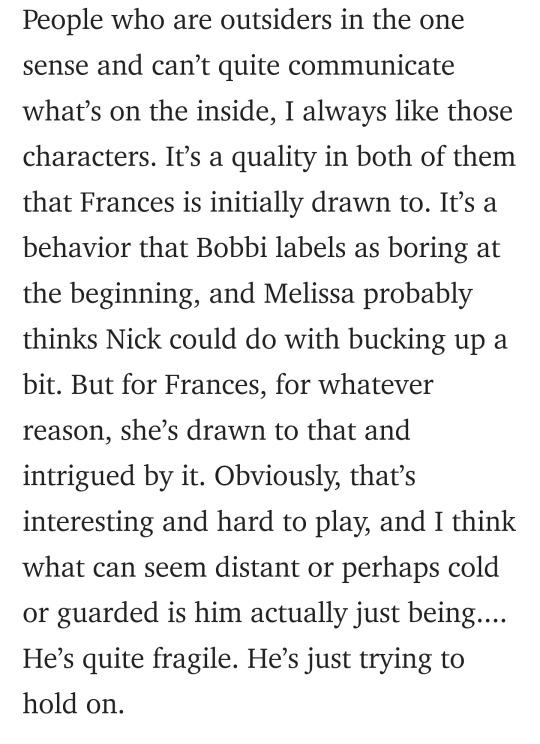

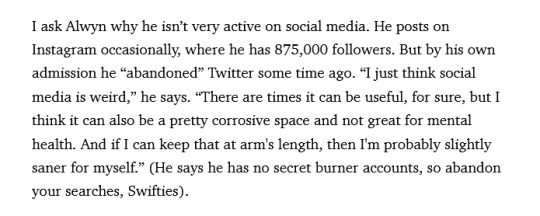

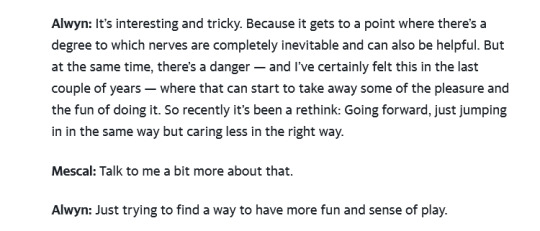




#free joe alwyn#joe alwyn#joealwyn#nonnie#q&a#jalwyn#toxic taylor swift#toxic swifties#mental health#male mental health#joe alwyn is beautiful#joe alwyn quotes
26 notes
·
View notes
Text
Hey guys, still running around like a headless chicken to get all my shit done and don't have time to properly address my inbox, but I did have a brief chat with a follower who is in need of resources I don't know of. This individual is transmasc and is also concerned about another transmasc person in their life in regards to body image and eating struggles. This individual has looked into ED-specific spaces and can only find recovery spaces for girls.
Does anyone know of support groups that promote healthy body image for men, or groups for trans people who struggle with their bodies due to dysphoria? Feel free to reblog or drop a reply in the comments, or shoot me a message on anon if you know of any resources.
34 notes
·
View notes
Text

3 notes
·
View notes
Text
pressure - about male mental health
When I was in sixth grade, the teacher handed out exams we took a week before. Obviously, everyone was nervous about their grade. The boy behind me, a good friend at the time, didn’t pass the test.
I turned around only to see him panicking. "It’s just one grade and it’s the beginning of the school year" I said, hoping he would worry less.
"No, you don’t understand!" He answered, his voice seemingly shaking from panic "I won’t be able to finish school with grades like this!"
"We’re in sixth grade!" I said, surprised by his train of thoughts.
And then, he went on to say something my eleven year old self hadn’t thought yet once:
"No you don’t get it. If I get a bad grade now and I don’t get better, don’t finish school or i finish but with a bad average; I will get a bad job and won’t make enough money. One day I have to feed a whole family, like, four people or something. I can’t do that without money"
When I was in seventh grade, there was this boy in my class. We weren’t that close but did talk to each other from time to time.
One day, I don’t remember why, he came to me crying about some problems he had at home. Nothing too serious but serious enough to make him feel bad.
I consoled him and after a while, he stopped crying. We hugged and he thanked me for being there for him. He paused and said: "Please don’t tell anyone I cried, it’s so embarrassing. The boys will make fun of me if they knew."
As a teenager, i used to visit my grandparents a few times a year. Their neighbors' kids would always come over to my grandparents farm because their dad was an alcoholic and sometimes hard to be around.
"Maybe your dad needs to go to therapy, maybe he needs to talk about stuff" I told them once, while we were feeding the chickens.
The older sister answered: "Our dad doesn’t want to talk about feelings."
Her younger sister bent down to pet a chicken and without even looking at us she chimed in "He never really talks about anything. He just drinks." and she said it like it's the most normal thing in the world.
Male mental health is something rarely talked about. It’s something people experience. The boy feeling the financial pressure of a family 20 years in advance, the boy being too scared to openly cry or the girls feeling abandoned by their dad.
In 2021, 75% of the suicides in Germany were committed by men. This shouldn’t come as a surprise to any of us as I’m sure you’ve all heard that suicide amongst men is extremely high - as opposed to suicide amongst women.
The question is, why is that?
For starters, men chose more lethal and violent means which decreases the amount of attempted self-killings. Most of the time and unfortunately, their methods are successful.
Their communication style is also very different: Men may be less likely to openly express their emotions or seek help, leading to a lack of emotional support.
Further on, there is also this stigma around mental health: Societal expectations and traditional gender roles may discourage men from admitting vulnerability or seeking mental health support.
When it comes to substance abuse (alcohol included!), since there are higher rates among males, there is a great possibility of drugs contributing to an increased risk of suicidal behavior.
In some cases, the men that do seek help (or at least try) often get dismissed, misdiagnosed or go unnoticed by doctors or any professionals due to stereotypes.
It’s interesting, I myself know of girls or women who have gone to the doctor or gyno with problems and were dismissed as overreacting. A few years back, my doctor wouldn’t want to take me in for a breast cancer exam „because the later I know, the better“ ?! When I wanted to quit birth control, my doctor said and I QUOTE: „Ugh, do you know how many girls come crying to me about the side effects of birth control? I mean, are you even aware that you will get pregnant if you stop taking it? Are you ready for that?“
So trust me when I tell you I know what it’s like to not being taken seriously regarding your health. And many men suffer greatly. It’s already hard to work up the courage and be a man in this society that wants to change his mental state, let a lone then being dismissed as „just stressed“ or „not that serious, maybe work out more“.
After that, who would give therapy or and doctor another try? And who could blame men for pulling back on socializing.
Which brings me to my next point: Social isolation is something men are often more prone to, thus resulting in the bottling up of feelings and in some cases, severe drug abuse.
It’s a deep dark rabbit hole.
So, what’s the solution?
As usual, the answer isn’t easy or short.
I think, and this is just my personal opinion, we should start early on:
To avoid the mental load building up over the years, we need to start educating and re-educating about mental health and the expressions of emotions from an early age on.
At school, at home, everywhere. We need to praise kids for carrying out their emotions, not punish them.
We need to force our male friends to talk about the things that bother them and keep a promise of confidentiality, creating a safe space.
We also need better doctors, less stereotypes and of course more equality, but that’s a given.
We need to look left and right, to see if there is someone struggling with their words.
We need to get rid of alcoholic dads and pressured boys.
i really hope to give my son the emotional freedom my male friends didn't have.

8 notes
·
View notes
Text
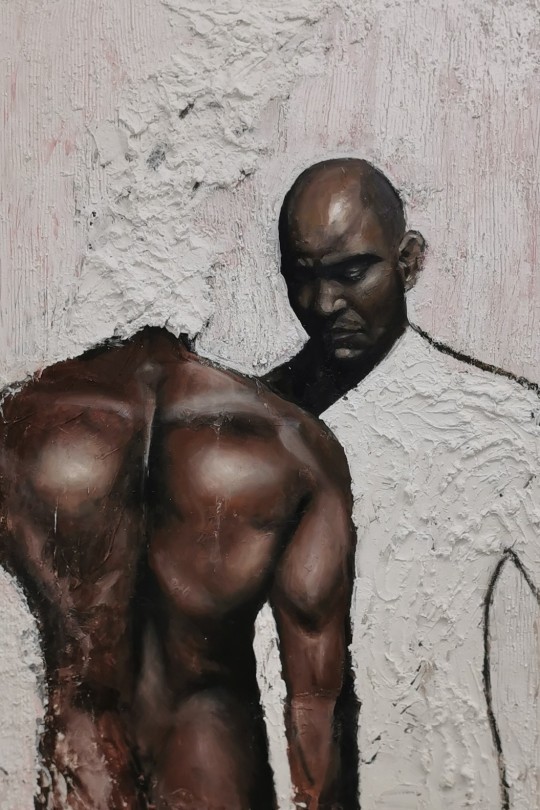
Childhood friends
By Hope Bartley
2023
IG: hope_the_artist
#life#love#art#black art#contemporary art#oil painting#support black artist#male mental health#mental health
5 notes
·
View notes
Text
Look out for each other, military or not
I just wanted to share this story because it has really fucked me up, and I’m hoping that someone will read this and see things in another perspective that might be able to help themselves, somebody else, or both. There’s no names, locations, or specific information in this.
This story starts around two months ago, with a staff sergeant making a mistake. He drank a little, hit a car while driving, panicked, and drove away. He got caught and charged with a DUI. If you don’t know, getting charged with a DUI is an automatic chapter which separates you from the Army. Also if you don’t know, as part of this chapter process you have to do a mental health evaluation, basically it is to check of there could have been a behavioral health reason that might have caused a certain behavior to cause the indecent. However, specifically for DUIs and failed UAs, it doesn’t matter if there were BH issues or not, to the Army those are non excusable so there’s almost no way to get it excused unless your command wants to retain you. So at that point we do this evaluation to see if there are any BH issues that they might want treatment for. Anyway, I was the one doing this staff sergeants evaluation. I was pretty nervous, because it was one of the first few that I had done on my own, meaning my supervisor wasn’t in there with me to make sure I was doing it right, at that point I had learned what I needed to do and how to do it. But me being a PV2 talking to a staff sergeant especially in this setting and under these circumstances was a little daunting.
You could tell right off the bat that this guy wasn’t really ok, his face was just completely flat, and so was his tone. I asked the questions I needed to ask, and in doing that he told me that he’s never really gotten seen for any of his physical things. So he has multiple suspected TBIs (concussions or other head injuries) that were untreated, and other things going on physically that were untreated. He has also never seen BH before coming in that day. He told me that he was kind of stuck in that stigma of BH that being seen ruins your career and that if you have issues you need to deal with them youself and not let anyone else see. He didn’t say that exactly outright, but that was pretty much the message. I had to really convince him to at least try the MFLC, where there’s no documentation or anything like that. Whether or not he went I don’t actually know. He had been attending SUDDC appointments, substance abuse counselors. I already figured from the evaluation that substance use was not the actual problem, but for DUIs and UAs, people are required by command to attend SUDDC, and I saw him at the clinic here and there whenever he came for those appointments.
Fast forward to two weeks ago. That Friday I had gone with my supervisor to the BHU (inpatient hospital) to watch her do another chapter evaluation. I wanted to go because I had never been to the BHU before, and she also offered. While I was there, I saw this same staff sergeant, who at this point had been demoted to sergeant, who was sitting in a tiny waiting room with his wife and his young daughter. I was surprised, because at that point I had no idea what had happened that had gotten him admitted to the BHU, but in that moment he looked happy, he was smiling and holding his daughter. He had recognized me and he said hello and I said hello back. Fast forward to this week, three days ago. The sergeant came in for a triage, telling me he wanted to talk to a provider. I gave him the forms he needed to sign and I told him I would take him back to talk after he was done. I figured I would do the triage since I have at least a small bit of rapport with him since I have sat down with him before, and I figured he would be more comfortable to open up about what was going on. Here comes the part that screwed me.
I didn’t even get out the limits of confidentiality before he had started speaking, I got to say them before he went further but just from that alone I knew this was going to be a bit of a bumpy ride. He started with telling me how things were not really going that great for him mentally, and right off the bat his voice was shaking as if he was going to burst into tears at any moment. So I knew that he would start crying eventually. He told me how he wouldn’t really be truthful whenever someone asked him about his mental health, or whenever he filled out the screenings on the computer (like the 0 to 4 stuff that you usually see). He said it was difficult to put a number on things, and I understood that. To me, putting a number on things like that is admitting that whatever is going on is, or isn’t, as bad as you think it is and it’s hard to think about it in that way in general. He told me that he had a reality check when he got his separation packet and realized that he really is getting out of something that has essentially been his life for 9 years. He told me that he has often been having anxiety attacks, bad enough to where he would have to go lay down for an hour or two until he felt well enough to get back in the game. He was telling me that with everything that has happened, the separation, an incident at the field the week before (I’ll explain more but it’s what got him admitted), he realized that he wanted, and needed, help. He told me how he was looking to get seen at the TBI clinic for those untreated concussions and other injuries, and how he eventually worked up the courage to go to the clinic that day. He told me about how for his entire career he always put the army, the mission, his soldiers, everything, before his mental and physical health. This is where he started to cry, it was pretty immediate, and man, the only other male I’ve seen cry that hard and that much was my boyfriend. That’s when things kind of just broke for him and all of the floodgates opened. What I got from it is that he basically sacrificed himself for doing what he believed in and doing what he thought was right for his country and others around him. I had to actively try to not tear up in front of him. He apologized, for crying, that always happens, but I told him it was ok.
He kept going with what happen in the field. In the field he had accidentally intoxicated himself with caffeine because he took some caffeine pills, which is something I’ve heard is common in the field. He told me how he was so stressed with the safety of everyone there because they were in a live range and they were not being as safe as they should have been. He told me how he was so stressed because everyone looked to him for answers because he was the most experienced there, he wondered what would happen if he wasn’t there to tell them what to do and to keep them safe. He talked to the Chaplain out there, and it had helped. Then he described to me what sounded like a hypomanic episode. He felt euphoric, better than he has in his life, felt like he was making all of the good and right decisions, and he couldn’t remember much of those days. He told me about how he got so angry that no one was listening to him him about the safety concerns that he punched something. His command took him out of the field and took him to the hospital, which is where they found out about the caffeine intoxication. He had asked them how much longer he had to be there, and they told him that he just had to answer a few more questions and he could go. What need up happening was that he got admitted to the BHU, which made him more angry and upset. I think it helped initially, because I saw him at the clinic after he got discharged and he told me he was doing so much better (that was early last week).
It had made me happy, because I had seen him when things were really sucking, and seeing that he was better just made me happy that I was part of the process that ended up helping. Obviously, that wasn’t 100% the case. He had been good when he was discharged, but I think the stress came back to him when he had to come back to reality. He told me that no one was really reaching out to him, even if he tried reaching out to them they didn’t respond back. Eventually he heard from someone that apparently he had threatened soldiers out in the field in the days where he was a little manic. Like I said he doesn’t remember much of it, so I’m sure you can see how this kind of freaked him out. He told me that it made him afraid, since he remembered something happening one way but others were telling him it happened another way. He told me how much he believed in what people were doing in the army and how people were fighting for our country and doing the best they could. He told me how he would never ever hurt his soldiers, or anyone (unless it was in self-defense or to protect his family) because “they’re my brothers, and you’re my sister.” Those were his exact words, and holy hell I don’t think I can describe the gut punch that it gave me.
Here we were, two near complete strangers, a male in his late 20s and an 18 year old female, and he was pouring out his soul to me and calling me his sister while he was in tears because that’s how much he believed in what the army does, that’s how much he believed that the army is family, that’s how much it hurt him to hear from others that he had threatened them (which, again, is something he doesn’t even remember doing), and that’s how huge of a connection you make just by sitting down and talking to someone for a little bit once or twice. It was the first thing I’ve encountered in this job that legitimately, brutally, broke my heart in the way it did, and I’ve encountered a lot of things in the 4-5 months I’ve been doing this job. I think I blanked out a little after that because I don’t really remember how we got to this next part. I just remember him saying “maybe I should have listened to you the first time, when you told me everyone needs a little help sometimes.” And maaaaannnnnnn.
Keep in mind I saw him for that evaluation two months ago, two months. After all of the crap that he’s been going through and experienced, he remembered one little sentence I told him two months ago when I was trying to tell him that it’s ok to need, and ask for, help. It was something I didn’t even remember saying until he said it back to me. It kind of blew my mind a little. He kept going saying how he would never hurt himself because he has a beautiful daughter and because he knows there’s something else out there for him, and how he knows that he wants to figure out what’s going on with him and get better, not just for himself, but his family too.
As it went on I could tell that he was feeling better, and I could actually see that he felt lighter. He even told me as much, how letting it all out felt like a huge weight was lifted. He apologized for going on and on about things, and I said it was ok again, and he thanked me for listening to what he was saying. He was smiling and laughing a little by the end of it, which let me tell you was a complete 180 from how he was when he had come in.
This fucked me up for a lot of different reasons, one of them being that he reminded me of my older brother, who is in the same MOS as this sergeant and has been in the army a similar amount of time and also has same things with BH, another was the fact that, like I said earlier, the only other male I’ve seen cry like that was my boyfriend. But something I learned was that there are sergeants, and staff sergeants, an junior enlisted, whatever, that are dealing with the same thing. They think that either BH will ruin things (I’m not going to lie, depending on how things turn out with your mental health, it might not end how you want it to), or that they shouldn’t show that they need help or ask for help because they should deal with it themselves. Because the mission comes first. And sure, that’s true in a sense, it’s just part of the army culture, but it’s also not how people should be dealing with their issues. It doesn’t matter if you think your the toughest person out there or that your issues might not be that big of a deal, like I told him, everyone needs a little bit of help sometimes, and IT’S OK TO ASK FOR HELP. It doesn’t make you any less of a person or weaker then the person beside you, it just means that you’re struggling, and you don’t know how to get through it. That’s what we’re here for. And it’s ok to be struggling and not know how to deal with it, again, that’s what we’re here for.
I understand that BH sometimes legitimately is a bad experience for some, it could be because of the provider, or that it did end up screwing with your carer. But please please please, those things are not worth your mental or physical health, it’s not worth destroying yourself over because of something that may or may not happen. So if someone looks off, or you have a gut feeling that something is wrong, be there for that person. I’m not saying bring them straight to BH, I’m saying that whether they look like they’re ok or not, it really helps to have people looking out for each other, and being that ear or that shoulder when they’re struggling and need to let it all out. Legit I’ve been crying over this experience for three days. As soon as he was taken care of and left, I went into one of the providers office and cried, like full on sobbed, for about 15 minutes. Seriously, if you think you need help, or that someone else needs help or like I said just someone to talk to, go talk to someone, or let someone talk to you so that you can be that safe space. I don’t think people realize the effect they can have on others when it comes to things like this. Both good and bad. Especially the males. Screw the macho man bullshit, it’s stupid, and in a way it’s degrading that they feel like they can’t share they’re feelings without being judged. Also, where I’m at we get more males needing BH help than females. And honestly I didn’t pay too much attention to that until I saw this sergeant and realized that nearly every day I’m sitting down with a male who is struggling with something or another. So males, it’s ok if you need help, it’s ok if you need to let it all out, not everything is always sunshine and rainbows for you and it’s ok that you feel that way. What’s not ok is that you have to live that way.
But yea, that’s the story, that’s my little rant. I just hope that this made sense, that it got through to someone, and that it helped even in the smallest way.
#mental health#army#army life#male mental health#therapist#sad but true#today i learned#mental heath awareness#mental heath tw#mental heath support#learn from me#please#don’t know what else to tag#let me know#military
5 notes
·
View notes
Text
Shout out to all my male mutuals. Hope your mental health is good or improving 🫡
3 notes
·
View notes
Text
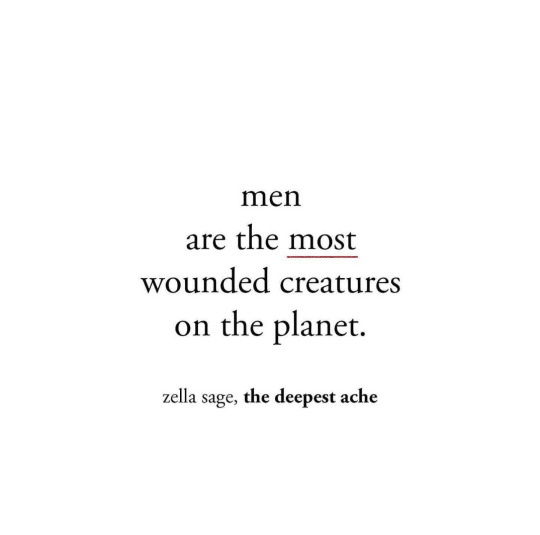

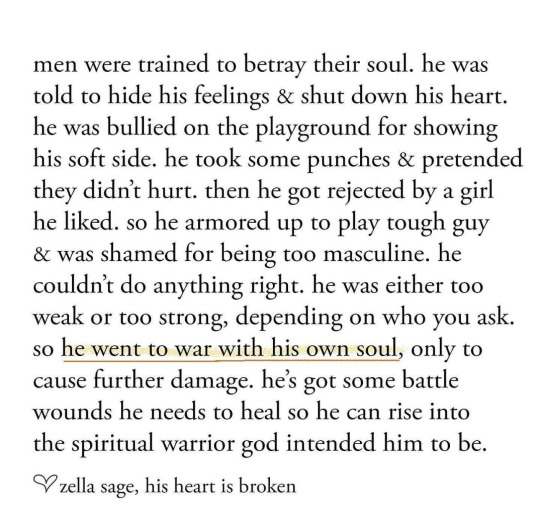



Some absolute truths by Zella Sage
3 notes
·
View notes
Text
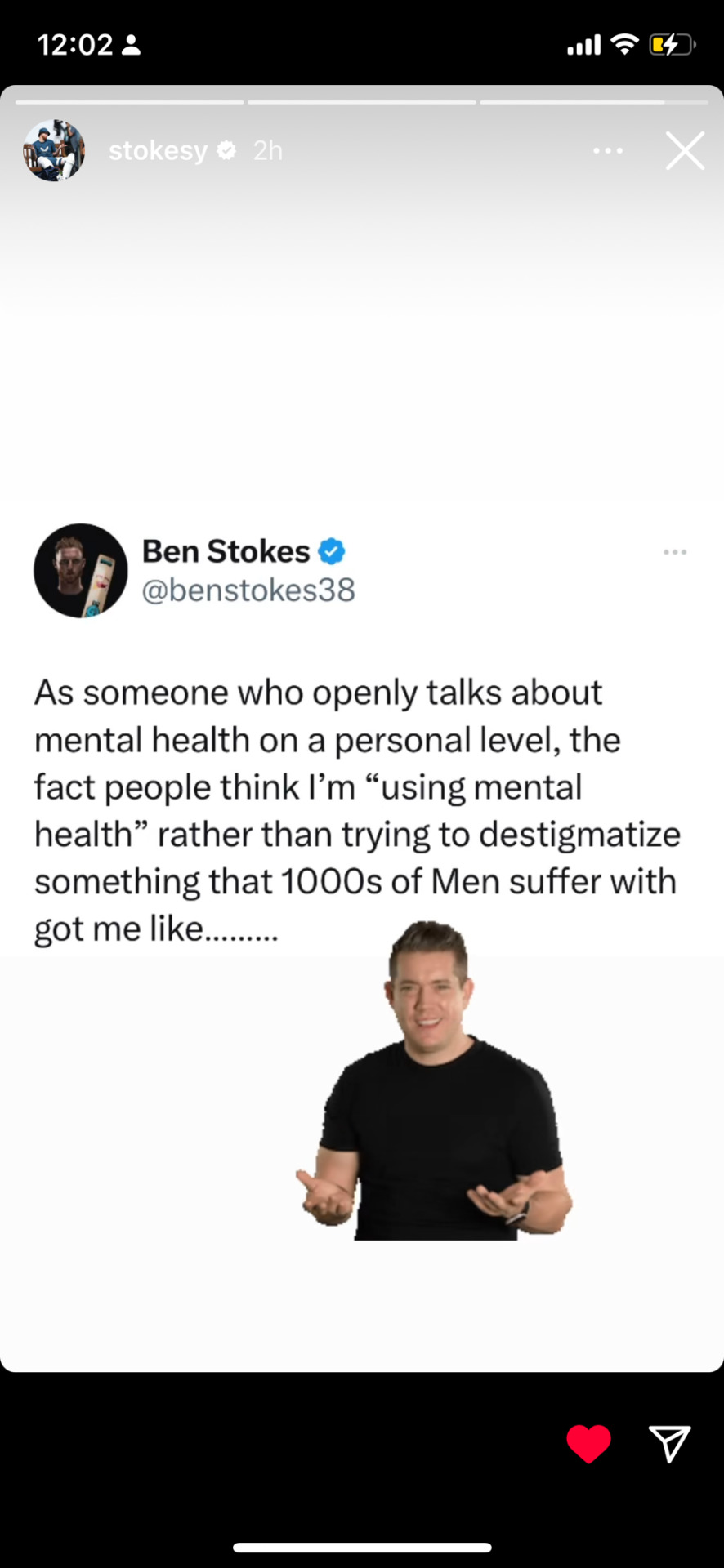
icon
5 notes
·
View notes
Text
Men's Mental Health Bechdel Test
(The Bob Dole Test / The Bob Test / The Dole Test)
1) Features at least 2 male characters.
2) Talk about things other than violence, aggression, or hypersexuality.
3) They openly discuss their emotions, highlighting male vulnerability.
Mens Mental Health Bechdel Test
(The Bob Dole Test / The Bob Test / The Dole Test)
1) Features at least 2 man characters.
2) Talk about things other than violence, aggression, or hypersexuality.
3) They openly discuss their emotions, highlighting man vulnerability.
Men Mental Health Bechdel Test
(The Bob Dole Test / The Bob Test / The Dole Test)
1) Features at least 2 male characters.
2) Talk about things other than violence, aggression, or hypersexuality.
3) They openly discuss their emotions, highlighting male vulnerability.
#Men's Mental Health#Mens Mental Health#Men Mental Health#Man's Mental Health#Mans Mental Health#Man Mental Health#Male's Mental Health#Males Mental Health#Male Mental Health#MensMentalHealth#MenMentalHealth#MansMentalHealth#ManMentalHealth#MalesMentalHealth#MaleMentalHealth#Bob Dole Test#Bob Test#Dole Test#BobDoleTest#BobTest#DoleTest#The Bob Dole Test#The Bob Test#The Dole Test#TheBobDoleTest#TheBobTest#TheDoleTest
0 notes
Text
Happy men's day, guys

And always remember. You're enough, I'm proud of you, your feelings matter and asking for help is necessary.
0 notes
Text




Convergence: the death of Ego rebirth of self.
Paintings done by me
IG: @hope_the_artist
#love#art#black art#contemporary art#oil painting#support black artist#male mental health#architecture#mental health#oil on canvas#textuted art#life#psychology
3 notes
·
View notes